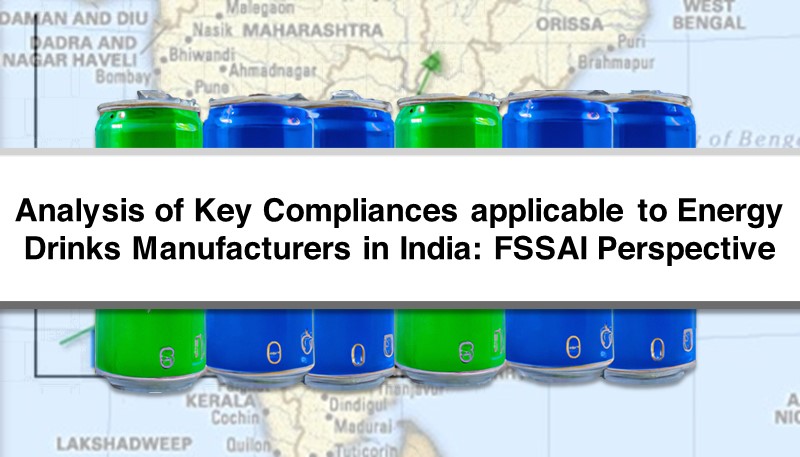Analysis of Key Compliances applicable to Energy Drinks Manufacturers in India: FSSAI Perspective

Indian market is filled with energy drinks and some of the popular brands within the Indian market are Pepsi, Coca-Cola, Fanta, Sprite, Red Bull, and Monster. While most of the consumers must have consumed energy drinks but I wonder if any of the consumers got that wings after consuming those energy drinks? Well, this blog is not about finding the energy drink which gave you wings, but to analyse the Food Safety and Standards Authority of India (FSSAI) laws applicable to Manufacturers of Energy Drink.
Energy Drinks are non-alcoholic beverages, which claims to re-energise the consumer by reducing tiredness, and providing physical stimulation. Any energy drinks available in the market contains a high level of caffeine which thereby stimulates the nervous system of the person consuming such drinks. Excess consumption of such energy drinks has an adverse effect upon the consumer health. In the interest of consumers, the Food Safety and Standards Authority of India (FSSAI) play a crucial role in regulating the manufacturers of energy drinks under Food Safety and Standards Regulation,2011. Non-compliance with such regulations may attract penalties and even get the FSSAI License of Manufactures of energy drinks cancelled.
The Manufacturers of Energy Drinks need to ensure the following key compliance while manufacturing such drinks:
- Limit the Caffeine Content: The Manufacturers of energy drinks must ensure that the caffeine content available in an energy drink is within the range of 145 and 300 mg/ litre.
- Ensure the energy drinks pass the audit test and appoint a food supervisor: The energy drinks produced by the manufacturer has to pass both the audit and hazard analysis test. This has been mandated by FSSAI to ensure that such drinks are safe for consumption. The appointment of food supervisor ensures that all energy drink manufactured are safe for consumption.
- Obtain FSSAI License: Obtaining a FSSAI license is a must for the manufacturers of energy drinks.
- Mandatory Labeling of Drinks containing Fruit content: If the energy drink manufactured by the manufacturer contains fruit contents, then a declaration about the same must be made on the label of such energy drink.
- Adhere to Micro-biological Standards: Manufacturers must ensure the micro-biological standards are adhered to while manufacturing such energy drinks, i.e., total soluble solid should not exceed 10% and in the fruit content standards the total content of lime juice should not exceed 5%.
- Adhere to certain packaging and labelling requirements: The manufacturers of energy drink must ensure that the plastic bottles must comprise of polycarbonate and polyethylene terephthalate (PET), and the packaging of 5 litre bottle must contain blue tint and also comply with Indian Standards, i.e., IS 9833. The total amount of pigment / colour in the bottle should not exceed the limit of 60 mg/ litre.
- Re-call the product unsafe for consumption: The products manufactured by the manufacturer of energy drink must be subject to strict audit and must be immediately re-called if it is unsafe for consumption.
The term energy drink is a huge misnomer. In order to make the public well aware of the same, several steps have been taken up by the FSSAI. It has made it mandatory for manufacturers to remove “energy” tag from the product and instead use the tag of “caffeinated beverage” for sale of such products. In June 2022, FSSAI had also directed companies manufacturing energy drinks to avoid using trademark similar to ORS and prominently declare on its packaging that such a product is not an ORS as recommended by World Health Organization (WHO).[1] Hence several steps have been set by the FSSAI for manufacturers of energy drink to comply with. Energy Drinks like Monster, Zinga and Cloud 9 were re-called in the year 2015 as it contained unsafe ingredients.[2]
Lexplosion Solutions have been assisting various energy drink manufacturers/ organizations in mitigating their risks by making such organisations aware of their legal and statutory duties and obligations. Our flagship Compliance Management Tool, Komrisk, has been helping FMCG companies in mitigating overall compliance risk. To know more connect with us now!
References:
[1] https://www.livemint.com/science/health/fssai-cracks-whip-on-the-use-of-ors-by-energy-drink-firms-11658250320608.html
[2] https://timesofindia.indiatimes.com/india/fssai-orders-recall-of-unsafe-energy-drink/articleshow/47636898.cms
Written by: Amanya Gangawat
Disclaimer
All material included in this blog is for informational purposes only and does not purport to be or constitute legal or other advice. This blog should not be used as a substitute for specific legal advice. Professional legal advice should be obtained before taking or refraining from an action as a result of the contents of this blog. We exclude any liability (including without limitation that for negligence or for any damages of any kind) for the content of this blog. The views and opinions expressed in this blog are those of the author/(s) alone and do not necessarily reflect the official position of Lexplosion Solutions. We make no representations, warranties or undertakings about any of the information, content or materials provided in this blog (including, without limitation, any as to quality, accuracy, completeness or reliability). All the contents of this blog, including the design, text, graphics, their selection and arrangement are the intellectual property of Lexplosion Solutions Private Limited and/or its licensors.
ALL RIGHTS RESERVED, and all moral rights are asserted and reserved.